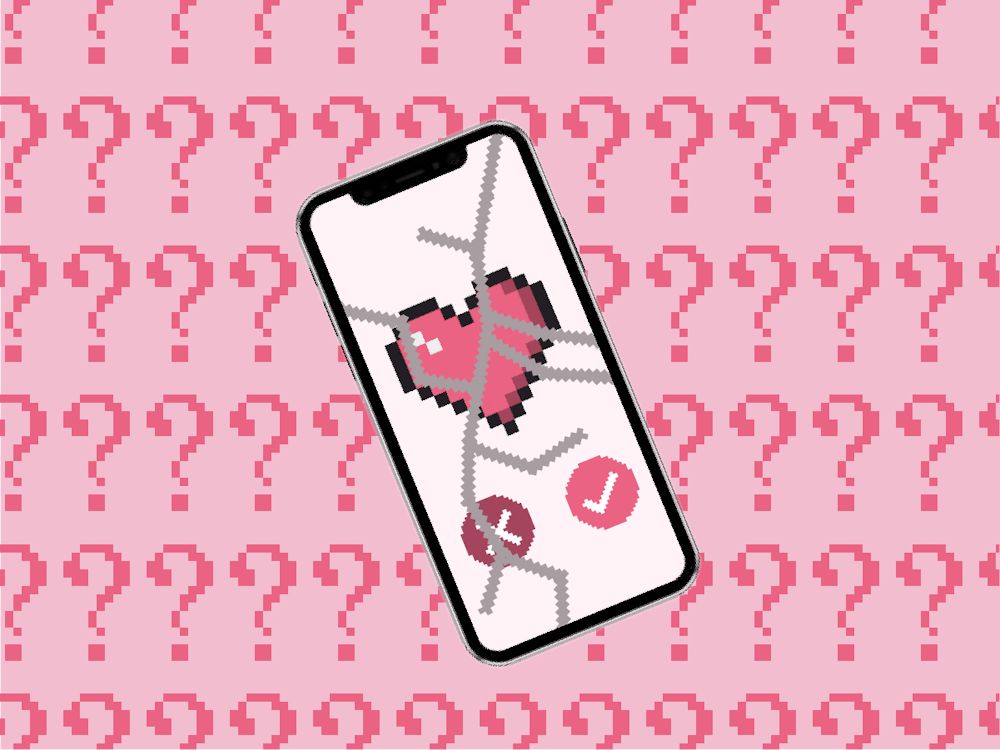Swiping on dating apps is endless. Each swipe offers brief hope for a romantic partner, but it more often leads to recycled conversations, sudden silences and isolation.
During Pride Month — a time meant to celebrate love, identity and connection — some UF students find themselves caught in a dating culture that rarely delivers what they are looking for.
The instant gratification from dating apps coincides with a shift in how relationships form in the 21st century, often emphasizing speed and convenience over depth and connection. In a world where likes are the currency of attraction, the search for authenticity can feel like an afterthought.
On dating apps like Hinge, Tinder and Bumble, a potential match could be one swipe away. What begins as a search for love turns into a swiping game where endless profiles, notifications and algorithms keep people scrolling, promising the next person could be “the one.”
For both LGBTQ+ and straight college students, the constant stream of options makes it difficult to build real relationships. This dynamic suggests a broader loneliness epidemic among Generation Z, whose members show high levels of isolation as they seek personal bonds online.
Krish Parikh, a 21-year-old UF public health senior, used Tinder to make connections on campus.
“When you come here [to college], you’re lonely in general,” he said. “And then, when you do get on these dating apps, you’re trying to fill a void.”
In his brief time on the apps, he got a glimpse of the online dating scene.
“You’re just scrolling endlessly,” Parikh said. “It’s like, right, left, right, left, left, left, and then hoping you’ll match with someone. [And then it’s] the same conversations over and over again.”
Disappointing experiences with online dating are part of a larger trend. Former U.S. Surgeon General Vivek Murthy said the nation is facing a loneliness epidemic, with young, college-aged adults being the most affected.
According to Ballard Brief, a student-led research initiative at Brigham Young University, nearly 80% of Gen Z reports feeling isolated or left out — a feeling that can be worsened by nonstop swiping.
Though these apps offer easy access to potential partners, users’ experiences reveal a more complicated reality.
For Sara Pelgar, a 22-year-old UF alumna, apps like Hinge have been gamified. Swiping has become addictive, and the chase for matches can go from casual to a cycle of self-worth tied to notifications.
“If you don’t get a certain number [of messages], or any, then you feel upset or frustrated,” Pelgar said. “Like, damn, why does no one find me attractive?”
Relying on dating apps for validation might stem from the lingering effects of COVID-19, she said. Accustomed to isolation, people may depend on the internet for socialization, making it harder to go out and make connections in their everyday lives.
While many students continue to struggle with dating app fatigue, others are finding alternative ways to build meaningful relationships online and offline. The Instagram account “thegvillechart” is a hub for Gainesville’s lesbian community that occasionally offers matchmaking services.
The account is run by Sophia Scribani, a 21-year-old UF health science junior. Scribani said she was inspired by the television show “The L Word.” The account was born from her curiosity about who was in the Gainesville lesbian community. It has since evolved into a resource for connecting LGBTQ+ students and locals.
The lesbian dating app experience often results in friendships rather than romantic attachments because of the difficulty of finding a spark through a screen, Scribani said.
“I think dating apps aren’t really the best breeding grounds for intentionality,” Scribani said. “A lot of lesbians tend to feel a bit of a disconnect from the broader local Gainesville lesbian community.”
While swiping fatigue emotionally drains users, some are left haunted by what a potential relationship could’ve been once text notifications cease.
“Ghosting,” or the act of suddenly ending a relationship with someone without explanation, is a common occurrence in online dating. Many college students find themselves in a cycle of brief, surface-level interactions.
It’s a problem that leaves people feeling disrespected, like they’ve wasted their time, Scribani said.
For many queer individuals who aren’t fully out, opening up only to be ghosted can be especially jarring, she said. Seeking vulnerability through the screen is crucial in the online dating process.
“When you decide to put yourself out there, you understand that while you don’t owe anyone reciprocation, you owe people basic respect,” she said.
Setting clear boundaries and intentions with your matches online can be difficult because of the fear of rejection, and Gainesville’s vibrant LGBTQ+ community can be daunting to someone unfamiliar with its robustness, she said.
Instead, Scribani recommends attending LGBTQ+ events within the community to get a foot in the door rather than relying on noncommittal dating apps.
Contact Isis Snow at isnow@alligator.org. Follow her on X @snow_isisUF.

Isis is a senior sports journalism student who is in her fourth semester at The Alligator. She previously has written for the Avenue desk and has covered the Florida volleyball beat. She also has experience in live broadcast reporting with WUFT. Despite hailing from Las Vegas, Nevada, she is a life-long Michigan and Detroit Lions fan. To make up for the emotional toll of being a fan of those teams, you will often find her in the gym weight lifting and playing basketball.






